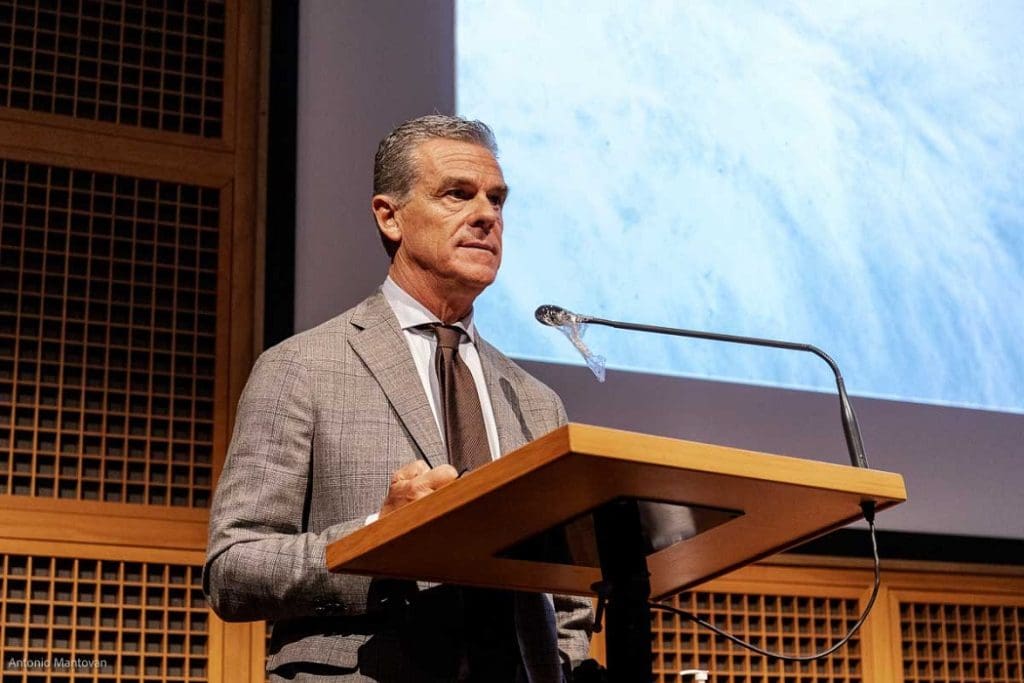
Italian Wool Trade Association president Claudio Lacchio.
ITALY’S wool trade has told Australia’s superfine growers it is facing a crisis with customers soon to cease accepting products originating from mulesed Merino sheep.
Just as Australian Superfine Wool Growers Association members are considering voting to make non-mulesing a membership requirement, it has been sent an open letter from the Italian Wool Trade Association.
Three ASWGA members have proposed that members be allowed to vote on becoming “a non-mulesed organisation” through a change to the body’s constitution, that would mean superfine growers who mules their sheep could not be ASWGA members.
IWTA president Claudio Lacchio told Sheep Central the association did not want to interfere with internal ASWGA issues nor comment on whether the ASWGA should have a vote on the issue.
“It is their internal issue, we just wanted to send, once again and after more than 25 years of a never-ending debate, the message that a certain market needs non-mulesed wool, and that many brands have set a deadline on this by 2025, which means buying the raw material now or in the next few months for 2025 garments in the shop.”
In the IWTA letter, Mr Lacchio said for the past 20 years, the Italian wool trade has been delivering the message to the Australian wool industry that an increasing number of its customers are refusing to use wool from sheep that have been mulesed.
 “On this point, I stress we have never attempted to tell growers how to produce wool, however, we would be negligent in not passing on our customers’ requirements.
“On this point, I stress we have never attempted to tell growers how to produce wool, however, we would be negligent in not passing on our customers’ requirements.
“The Italian wool trade is now facing the crisis that their customers will cease to accept wool products from mulesed sheep in the very near future. Around the world the list of brands and retailers on this path increases every day,” Mr Lacchio wrote.
“This market intelligence is passed onto to ASWGA not as an ultimatum but as the stark reality facing both our industries.
“There is a critical need for coherent messages from customers of Australian fine wool being delivered to members through a strong ASWGA,” he wrote in the letter.
“With regard to this current discussion, we feel it very important to note the role of ASWGA as being the information conduit between the Italian wool trade and producers of superfine wool. The Italian wool trade association wants to help facilitate this whenever and wherever possible.”
When asked if there was a need for leadership on the issue of mulesing in the Australian industry, Mr Lacchio told Sheep Central “we don’t have much time left” to take action.
“I believe the Australian industry is so much behind in this area that we don’t have much time left, actually none, having been discussing the same issue for the last 25 years with little, if any, solution.”
Mr Lacchio would not be drawn on whether the role of the ASWGA as the information conduit between the Italian wool trade and producers of superfine wool might be jeopardised if the growers association did not pursue the proposed constitutional change.
“We just think that the message should be loud and clear, about the need for the market of non-mulesed wools.
“The link and relationship of ASWGA with the Italian textile industry goes back many years and they produce in terms of quality, the wool we are after, so our letter goes in this direction, the one of reinforcing a concept too-long discussed.”
Mr Lacchio said there are now alternatives to Australian wool.
“It is just a pity, and a shame I may add, for our fellow Australian growers to lose the opportunity to compete in the highest end of the apparel market in the near future.”
Click here to read the full IWTA letter.

Will they ever get the message? We can’t go on setting new deadlines and having them ignored. No one advocating non-mulesing is telling wool growers how they should produce their wool. They are advising them what they should do to make their wool acceptable in their markets, both locally and abroad.
Why wouldn’t the Italians get on board with Dr Jim Watts? It’s the Italian processors 25 years ago till lately that have been messaging Australian growers not to breed highly blowfly-resistant Merinos that Dr Jim Watts was promoting. Now they reckon its almost too late. There is still time. It only takes one generation of the correct 14-20 micron genetics these days to be highly blowfly-resistant to stop mulesing.
This message from the Italians is a microcosm of the whole industry. Is it time to wind up AWI? I’m not sure the $100 million a year is giving levy payers any benefit. There is still too much influence from the old guard. I just hope we don’t lose the industry while we get a new body to direct the traffic.
There is research that we badly need, and only if we could get a choice on where our levies are spent. There are too many on the gravy train still. AWI needs to get head office out of Sydney and stop paying huge rents. AWI hopefully will get with the program eventually; with what the retailer needs to sell wool and then start encouraging growers to do likewise.
There were two principal reasons ‘the Italians’ would not get on board with the type of wools Jim Watts was encouraging the industry to breed. The first was technical and the other was political.
Certainly by 1995, the Biella wool trade knew that these longer, deep crimping, discreet fibre bundled, silky soft wools, that we then called elite, combed and spun to much greater efficiency than traditional fine wools and produced a beautiful fabric. However, when spinning these elite wools the spindles needed adjustment to account for the longer fibres. Unsure of the actual supply of elite wool at that time, the Italians opted to stick with the wool length and type they were familiar with, that commercially was not an unreasonable thing to do, as the down time in adjusting a million spindles is not insignificant.
Secondly, Australian Wool Innovation could never and has never, been able resolve the conflict between traditional sheep classing, quantitative genetics and the skin biologists. The arguments between skin biologists and quantitative geneticist goes back well before Jim Watts to the 1940s and the first Merino skin biologist Harold B Carter.
Had AWI had a bigger vision they would have realised that there was a place for all three and all three were equally important and all three required scientific investment if the wool industry was to advance. Had that investment been made the wool industry would have had the framework and the scientific expertise to immediately address issues that were to emerge, such as mulesing.
When all is said and done, biological genetics and quantitative genetics should be complementary; one helping to validate the other. But no, vested interests that have and have always plagued AWI ensured the focus remained at a very mundane self-interested navel gazing level.
Jim Gordon is quite correct; the wool growing industry will not progress until AWI is no longer and is replaced with a new organisation run by people who have energy, vision and the capacity to engage good science to address the practical requirements of the industry.
So will the pro-flystrike clothes people be turning to synthetics? It is neither carbon neutral nor climate friendly.
Glenn, what is the best product for the environment and most carbon-friendly has nothing to do either with common sense or science. It’s all about who controls the carbon accounting. Carbon accounting is the most corrupt accounting system of all. It is all about who controls the methodology. Up until now the synthetic industry has been running the show, whilst AWI has been, as usual, asleep at the wheel. Any wonder wool comes off as it does.